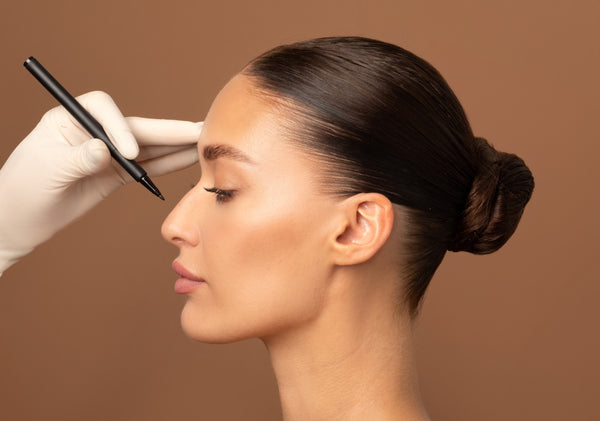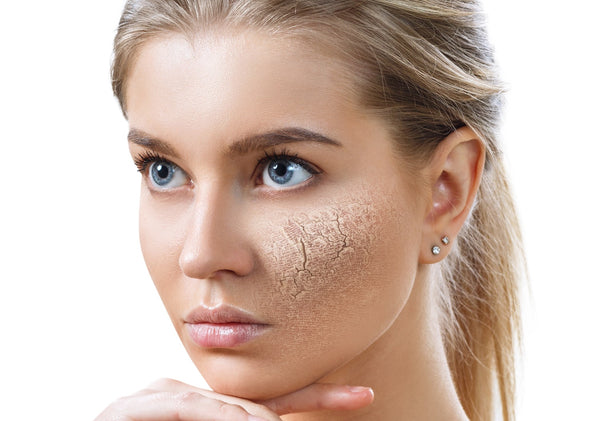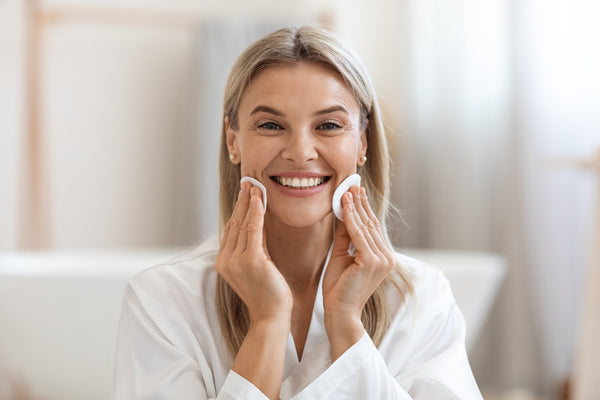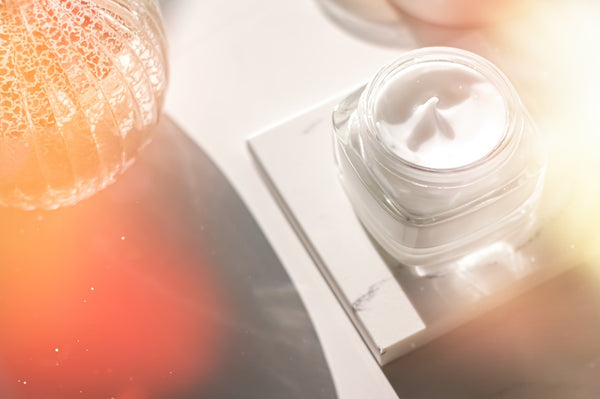Optimizing Your Skincare for Acne-Prone Skin

Optimizing Your Skincare for Acne-Prone Skin
When you have acne-prone skin, trying new products is always a roll of the dice. Will it smooth out the bumps or prompt more to make their unwelcome appearance?
Cue the anxiety.
At MD GLAM, we understand the physical and emotional frustrations that come with acne-prone skin. The upside? A well-planned acne-prone skincare routine is your answer to maintaining clarity, balance, and unwavering self-love.
In this guide, we break down the mechanics of acne-prone complexions and how to pick products that help it flourish.
Ready to craft your holy-grail routine? Keep reading.
Understanding Acne-Prone Skin and Its Triggers
Acne occurs when your pores (glorified hair follicles) become blocked. This can happen for different reasons, like:
- Trapped dirt or grime
- Overproduction of sebum (oil)
- Bacteria and impurities
- Hormonal fluctuations
- Irritation or allergies
-
Certain foods
There are also different types of acne:
- Blackheads (open clogged pores)
- Whiteheads (closed clogged pores)
- Papules (small red, tender bumps on the skin)
- Pustules (pus-filled papules)
- Nodules (large, solid, painful bumps under the skin)
- Cystic acne (painful, pus-filled bumps under the skin)
As annoying as it is, acne is a natural part of skin biology. And you’re not in this alone, either—almost 50 million adults struggle with acne-prone skin.
But technically, anyone can get acne, right? So, how do you know the difference between breakouts and acne-prone skin? Ultimately, it comes down to the frequency.
If your acne is far and in between, you’re probably dealing with occasional breakouts. However, if you’re constantly struggling with some sort of blemish (or one that never goes away), there’s a good chance you have acne-prone skin.
We firmly believe your skin is beautiful at every phase, even at its bumpiest. But we know you may not always feel the same way. The good news? Adopting the right skincare habits can do wonders for your relationship with your skin.
The Ultimate Acne-Prone Skincare Routine: Choosing the Right Products
Acne-prone skin types need to be extremely intentional with the products they use. The wrong ingredient or combination of products could hurl your complexion into even bumpier territory.
In other words, smart product selection is everything.
Not sure where to start? Don’t worry—we put together a cheat sheet to get you going:
Get familiar with acne-friendly ingredients
Skin prone to acne thrives with non-comedogenic products. These are formulas that contain ingredients with a low risk of clogging your pores.
|
Ingredients to support acne-prone skin: |
Ingredients to steer clear of: |
|
|
Come across a salicylic acid cleanser you’d like to try? Go for it. But that trendy moisturizer loaded with parabens? Hard pass.
Speaking of cleansers…
Opt for cleansers that do more than cleanse
Washing your face morning and night is essential for preventing build-up that could clog pores. Unfortunately, many cleansers are too harsh on the skin, drying out your complexion and stripping it of its healthy oils.
These oils fortify your moisture barrier, your skin’s first line of defense against acne-causing bacteria. And when your skin’s barrier is damaged? It becomes ground zero for breakouts.
We prefer cleansers that go beyond washing your face. That means choosing formulas that infuse skin-boosting minerals and vitamins with every cleanse.
- Our go-to cleanser for acne-prone skin: MD GLAM Deep Pore Foaming Cleanser
Use toners for acne prevention
There’s always been debate over toners in skincare—are they a necessary step or purely supplemental? Short answer: it depends.
Toners were initially designed to balance your skin’s pH post-cleanse and pick up any residual grime your cleanser left behind. But when you use a high-quality cleanser, there’s simply no need for the extra step.
Today, you can use toners to target different complexion concerns like… you guessed it, acne prevention.
- Recommended toner for acne-prone skin: EltaMD Skin Recovery Essence Toner
Moisturizing is a universal must
Moisturizing oily skin can seem paradoxical. If it’s oily, it must be hydrated, right?
This stems from the idea that your skin's natural oiliness is enough to keep it moisturized. The truth? Sebum and moisture are not one and the same.
Skipping moisturizer could cause your skin to produce more sebum to compensate for dryness, starting a cycle of imbalance. But when it comes to acne, you need moisturizers that give your skin the hydration it needs at different times of the day.
- Our go-to moisturizers for acne-prone skin: MD GLAM’s DMAE Antioxidant Day Moisturizer and Hyaluronic Acid Night C-Complex
Exfoliate weekly to keep pores pure
Exfoliating has tons of benefits for the skin—from removing dead skin and unclogging pores to improving texture and making your complexion look more youthful.
The catch? Many formulas are too abrasive on the skin, wreaking havoc on your moisture barrier.
Weekly exfoliation for acne can be game-changing. But choose a formula that’s too aggravating? You risk major skin damage.
- Our go-to scrub for acne-prone skin: MD GLAM Exfoliating Enzyme Scrub
Use acne spot treatment for stubborn blemishes
Even though we’re used to a bit of texture, certain breakouts call for extra TLC. That’s where spot treatments come in.
The thing is, not all acne spot treatments are created equal. The one you choose depends on what type of blemishes you’re battling.
Fighting blackheads or whiteheads? Pick a salicylic acid-based formula.
Combatting your everyday zits? Reach for benzoyl peroxide treatments.
- Recommended spot treatment for acne-prone skin: La Roche-Posay Effaclar Duo Acne Spot Treatment
Make SPF non-negotiable
Just like moisturizer, SPF for oily skin is a must. In fact, it’s vital for every skin type.
We all love a sunkissed glow, but let’s face it—too much sun doesn’t do your skin balance any favors. Over-exposure leads to dry skin, prompting your sebaceous (oil-producing) glands to work overtime.
When choosing sunscreen for acne-prone skin, you want formulas that don’t contain acne-causing ingredients. We have a particular affinity for those infused with nourishment, like vitamins and antioxidants.
- Our go-to SPF for acne-prone skin: MD GLAM Sunshout Sunscreen SPF 50
But remember, skincare’s only part of the equation—the choices you make daily play an equally important role.
Skincare Lifestyle Changes for Acne-Prone Skin
Here are some steps you can take outside of skincare to boost your complexion:
- Diet and acne are closely linked, so maintain balanced nutrition.
- Avoid switching out your skincare too frequently.
- Incorporate skin-supporting supplements.
- Avoid using expired makeup and skincare.
- Try to manage your stress levels.
- Don’t be afraid to talk to a dermatologist.
MD GLAM: Your Secret Weapon for Oh-So-Smooth Skin
We know that acne has a way of shaking your confidence, leaving you feeling less than amazing. We’re here to change that.
An acne-prone skincare routine with the right combination of proven products can make all the difference.
It’s time to nurture and embrace your skin’s unique radiance.
Shop our collection of acne-soothing, medical-grade skincare today.









